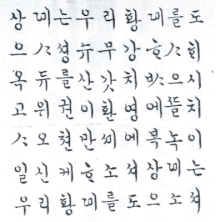| English: "Korean Empire Aegukga" | |
|---|---|
| 대한제국 애국가 大韓帝國愛國歌 | |
 | |
Former national anthem of | |
| Also known as | (English: "Anthem of the Korean Empire") |
| Lyrics | Min Young-hwan, 1902 (1902) |
| Music | Franz Eckert, 1902 (1902) |
| Adopted | 1 July 1902 (1902-07) |
| Relinquished | 29 August 1910 (1910-08) |
| Audio sample | |
| National anthem of the Korean Empire | |
| Hunminjeongeum | 대한제국 애국가 |
|---|---|
| Hanja | 大韓帝國愛國歌 |
| Revised Romanization | Daehan Jeguk Aegukga |
| McCune–Reischauer | Taehan Cheguk Aegukka |
The "Patriotic Hymn of the Great Korean Empire" (Korean: 대한제국 애국가; Hanja: 大韓帝國愛國歌; lit. '"Great Korean empire patriotic song"') was the national anthem of the Korean Empire during the 1900s. It was the first and only national anthem of a unified Korean state to date.
History
The national anthem was first commissioned by Emperor Gojong in 1901 and presented to the Korean court on 1 July 1902, by German composer Franz Eckert, who was the director of the Korean Empire's military band at the time. It was published in Germany in five different languages (Korean, German, English, Chinese, and French) and performed for the first time on 9 September 1902, during Emperor Gojong's birthday ceremony.
The imminent demise of the Korean Empire's independence, however, meant that the state anthem did not become widely promulgated or available. With the signing of the Eulsa Treaty in 1905, the Korean Empire was made into a colony of the Empire of Japan and in 1910 was annexed outright by Japan with "Kimigayo" replacing the Korean national anthem.
Lyrics (monarchist version)
| Original Korean | English | Modern Korean translation |
|---|---|---|
|
上帝상뎨는 우리 皇帝황뎨를 도으ᄉᆞ |
May God save our emperor. |
상제여, 우리 황제를 도우소서. |
It was the original version made for Emperor Gojong.
Lyrics (republican version)
The republican lyrics were re-discovered on 13 August 2004, by curator Lee Dong-guk of the Seoul Calligraphy Art Museum. The surviving specimen was a copy kept by the Korean-American Club of Honolulu-Wahiawa and published in 1910 under the title Korean old national hymn in English and 죠션국가 (lit. 'Korean national anthem') in Korean.
The discovery came as a surprise even in South Korea, where the existence of the republican lyrics was unknown until then. The finding was later reported in the mass media and has since then been performed by various K-pop artists. Hawaii has been a source for various pre-Japanese annexation heritage investigations by South Korea since many Korean Empire citizens emigrated to Hawaii before the Japanese annexation. One recent incident involved a Korean Empire émigré descendant donating a very rare 100-plus-year-old original passport issued by the Korean Empire to South Korean president Roh Moo-hyun during his visit to Hawaii.
The republican lyrics are:
| Old Korean with hanja added | Romanisation (RR) | English | Modern Korean translation | Romanisation (RR) |
|---|---|---|---|---|
|
샹뎨(上帝)는 우리 나라를 도으소셔 |
syangdyeneun uri narareul do-eusosyeo |
God, help our nation. |
상제여, 우리나라를 도우소서. |
Sangjeyeo, uri narareul dousoseo |
While the copy appearing in the source appears markedly newer than the 1900s and calls it the "Korean national anthem" (Korean: 죠션 국가) instead of "Patriotic song of the Korean Empire" (大韓帝國愛國歌) as one would expect from a 1900s original, it clearly shows pre-1933 orthography (reproduced here) that was not used after the 1940s.
See also
Notes
- There has been debate over the phrase "fifty millions." '오' might be interpreted as the number 5, or the exclamation "Oh!"
References
- "Anthem of the Korean Empire". NationalAnthems.
- "대한제국 애국가 악보·군복 등록문화재". Seoul Shinmun. 2020-08-12. Retrieved 2021-11-30.
- ^ "최초의 國歌 하와이版 발견". Kyunghyang Shinmun. 2004-08-13.
- "KOREA DATABASE AGENCY". Archived from the original on 2014-05-25. Retrieved 2014-05-24.
- ^ (in Korean) Chosun.com 카페 Archived 2011-07-08 at the Wayback Machine
- "Blog regarding the KBS-TV broadcast of Korean Empire Anthem".
- "Archived copy". www.scjnet.co.kr. Archived from the original on 22 July 2011. Retrieved 13 January 2022.
{{cite web}}: CS1 maint: archived copy as title (link)
| National anthems of Korea | |
|---|---|
|